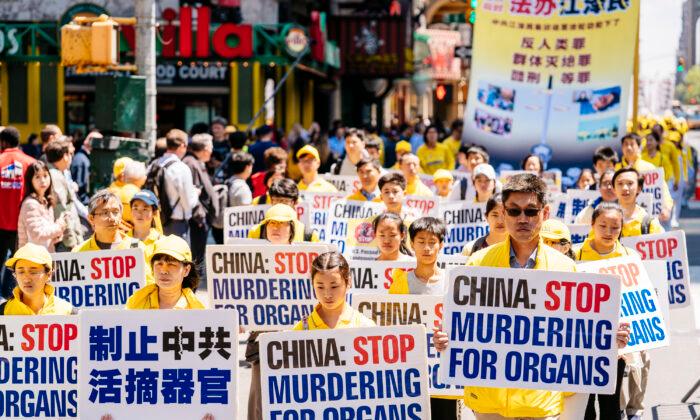China’s abysmal human rights record, particularly in persecuting the spiritual group Falun Gong, was a focus of the latest human rights report by the U.S. State Department.
Every year, the State Department assesses countries around the world on their human rights record.
Pompeo reiterated his remarks from July last year at a State Department-hosted religious freedom conference, calling China’s treatment of Uyghurs in northwestern China’s Xinjiang the “stain of the century.” He added that Beijing “tries to hide what it’s doing by intimidating journalists.”
“It’s imprisoning religious minorities in internment camps—part of its historic antipathy to religious believers,” Pompeo said.
Pompeo also criticized Venezuela, Iran, and Cuba for their human rights abuses.
Organ Harvesting
The report also pointed to China’s state-sanctioned practice of killing prisoners of conscience for organ transplant surgery, citing two recent findings.In June 2019, a nongovernmental independent people’s tribunal in London found “direct and indirect evidence of forced organ harvesting” in China, citing “extraordinarily short waiting times” and “massive infrastructure development of facilities and medical personnel for organ transplant operations.”
The panel, known as the China Tribunal, concluded beyond a reasonable doubt that state-sanctioned forced organ harvesting had taken place for years in China “on a significant scale,” and is still taking place today.
Additionally, panelists found that adherents of Falun Gong have been the main source of organs.
Lawyers
Lawyers in China are also being targeted by the Chinese regime for taking on “sensitive” cases, such as “defending pro-democracy dissidents, house-church activists, Falun Gong practitioners, or government critics,” the report stated. Such lawyers were punished by authorities, including with revocation of their licenses or imprisonment.For example, Liu Zhengqing, a lawyer based in southern China’s Guangdong Province, is known for defending rights activists and adherents of Falun Gong. In January this year, Liu had his license revoked after he was charged by local prosecutors with “jeopardizing national security.”
“Lawyers are required to be members of the CCP-controlled All China Lawyers Association, and the Ministry of Justice requires all lawyers to pledge their loyalty to the leadership of the CCP upon issuance or annual renewal of their license to practice law,” the report explained. The regulation was issued in July 2018, a move that drew concerns about the further erosion of rule of law in China.
Another Chinese lawyer, Qin Yongpei, who worked on cases involving Falun Gong adherents and lawyers arrested in connection to a nationwide crackdown in July 2015, was disbarred in May 2018. The crackdown, whereby hundreds of lawyers were rounded up across China, is commonly known as the 709 incident.
He was then detained by secret police in southern China’s Guangxi region in October last year, on charges of “inciting subversion of state power,” according to the State Department report. He was formally arrested in December.
Continued Persecution
The report identified many political prisoners that are still detained in China as of the end of last year, including two Falun Gong adherents, Bian Lichao and Ma Zhenyu.Bian, a former middle school teacher in Tangshan city in northern China’s Hebei Province, was sentenced to a 12-year prison term in 2012, according to Minghui.org, a website that monitors the persecution of Falun Gong in China.
In March 2014, Bian’s wife and daughter were kidnapped by local police in Hebei. They were then tried in court in December the same year. In April 2015, the daughter was sentenced to 3.5 years and the wife 4 years, on charges of “promoting Falun Gong on the internet.”
Ma Zhenyu was formerly a radar engineer working for the 14th research institute of the state-run China Electronics Technology Group Corporation.
Appearing at the aforementioned 2019 religious freedom conference hosted by the State Department in Washington, Zhang expressed worries that her husband may be killed for his organs while imprisoned.
According to Zhang, Ma was sentenced in 2017 for sending six letters to the Chinese regime’s top leaders urging them to end the persecution of Falun Gong.





